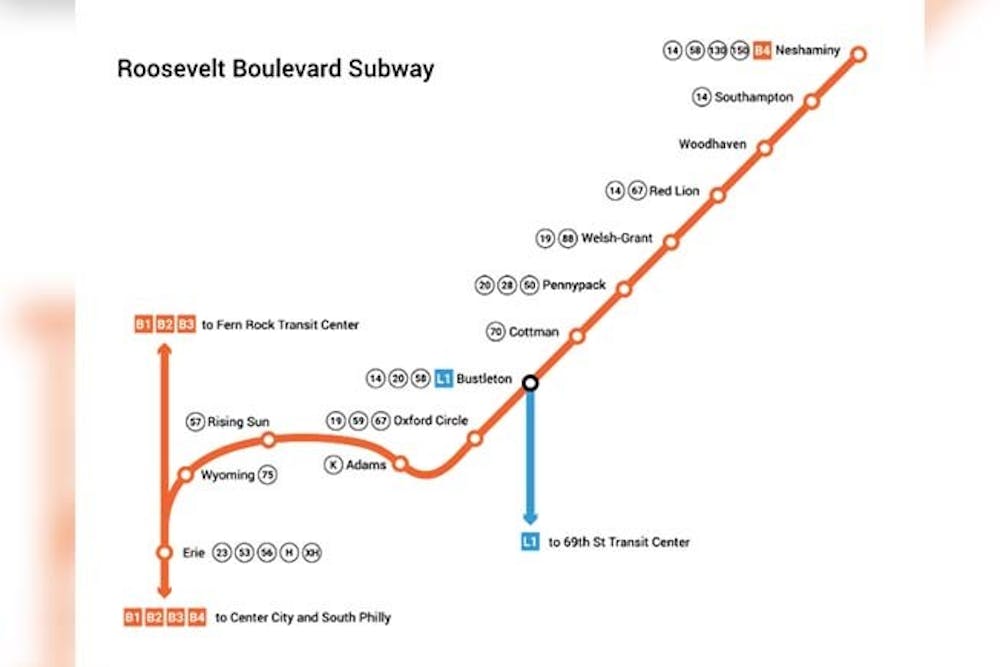
Jay Arzu, Ph.D. student at the School of Design, proposed a new subway line in Northeast Philadelphia.
Jay Arzu, a second-year Ph.D. student at Penn’s Stuart Weitzman School of Design, is leading a campaign to construct a new subway line in Northeast Philadelphia.
The proposed line, which will be called the Roosevelt Boulevard Subway, would stretch as far north as Neshaminy in Bucks County, Pa., and will continue south to Center City, according to Arzu. The line will also connect to the Broad Street Line and extend the Market-Frankford Line by one mile. The line — which could take the form of either an elevated line or a subway — would provide Northeast Philadelphia residents faster and more convenient transportation to Center City, Arzu said.
“Northeast Philadelphia is an area that has 500,000 people. It’s larger than the island of Manhattan, and it has very, very poor public transportation connection to the rest of the city,” Arzu said.
While also working on his Ph.D. in City and Regional Planning at Weitzman, Arzu is heading the campaign for the Roosevelt Boulevard line with support from Pennsylvania state Rep. Jared Solomon and 5th Square, Philadelphia’s urbanist political action committee. After Arzu began campaigning for the project in February 2022, he worked with the group to hold a public town hall on Aug. 27 to gauge the community’s opinion.
“I was nervous to see how many people would come. Would people actually show up and show face for something like this? So I got there and people just started streaming in, and the room was standing room only,” Arzu said about the Aug. 27 town hall.
At the town hall, there was a whiteboard with three options: “subway,” “elevated rail,” and “improve bus service,” where the attendees could tally their votes. The majority of the people tallied their votes under elevated rail or subway, which are “kind of interchangeable” because the Roosevelt Boulevard Subway could be a subway that turns into an elevated rail, Arzu said.
“People were just so gung-ho about the subway idea,” Arzu said.
One of the main reasons for the construction of the subway line is to reduce the traffic on Roosevelt Boulevard, a 12-lane highway that contains some of the most dangerous intersections in the country, as designated by State Farm Insurance.
Arzu says the line is especially important for the minority communities that have moved to Northeast Philadelphia. For people who don’t have a car, the commute from Northeast Philadelphia to Center City can take over an hour. With the new line, the trip would take 35 minutes, Arzu says. He adds that it is important that people who do not have a car can also have access to opportunities in the city, and that people from other areas of Philadelphia should be able to access the culture in Northeast Philadelphia.
“I would say most Penn students have never been in Northeast Philadelphia because the commuter rail lines that run there are not convenient to anybody,” Arzu said.
Although the majority of the community is in favor of establishing the Roosevelt Boulevard Subway, the team faces several challenges — such as the cost of the line. According to Arzu, the price of the project will likely cost anywhere between $7 billion to $10 billion.
Arzu referenced the National Infrastructure Reinvestment Bank as a source of funding for the project, from which Philadelphia would obtain a low-interest loan to build the subway. However, the projected price of the line will only increase with time, Arzu said.
“What needs to happen is that there has to be a way to get this fully funded from the beginning because otherwise, Philadelphia can’t afford it,” Arzu said. “The state of Pennsylvania can’t afford it. We need everyone to come together.”
Another challenge for the project is gaining the cooperation of SEPTA. According to Arzu, SEPTA has other priorities, such as the King of Prussia Rail. The King of Prussia Rail will have about 4,000 riders, while a 1999-2003 study projected 124,500 riders for the Roosevelt Boulevard Subway.
The subway also needs to be approved by the government with an environmental impact statement, a process that can take anywhere from three to five years.
Arzu added that the physical construction of the subway would be a “huge endeavor” if approved, but would create thousands of jobs and economic development.
“I’m putting my feet on the pavement because I know that the process of getting the community together is going to take so much time. Meanwhile, there are community members who need the subway today. I’m fighting every day,” Arzu said.
The Daily Pennsylvanian is an independent, student-run newspaper. Please consider making a donation to support the coverage that shapes the University. Your generosity ensures a future of strong journalism at Penn.
Donate







